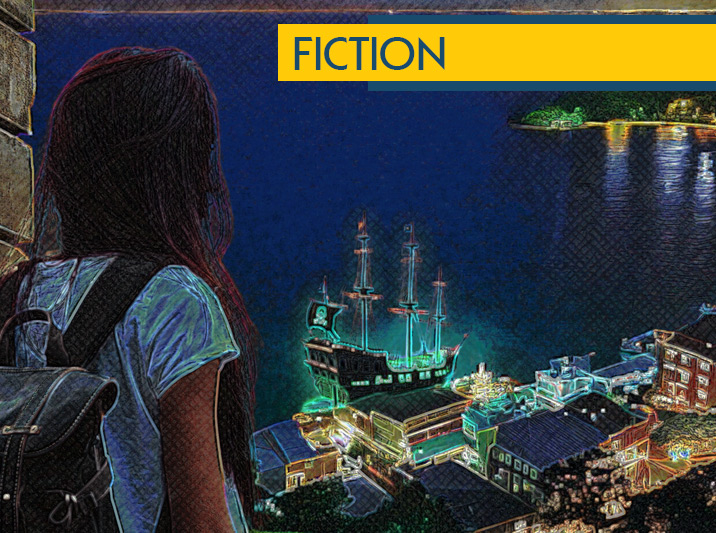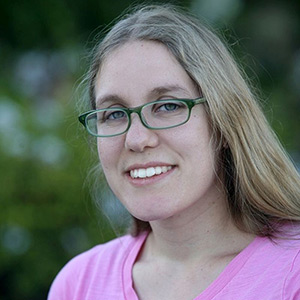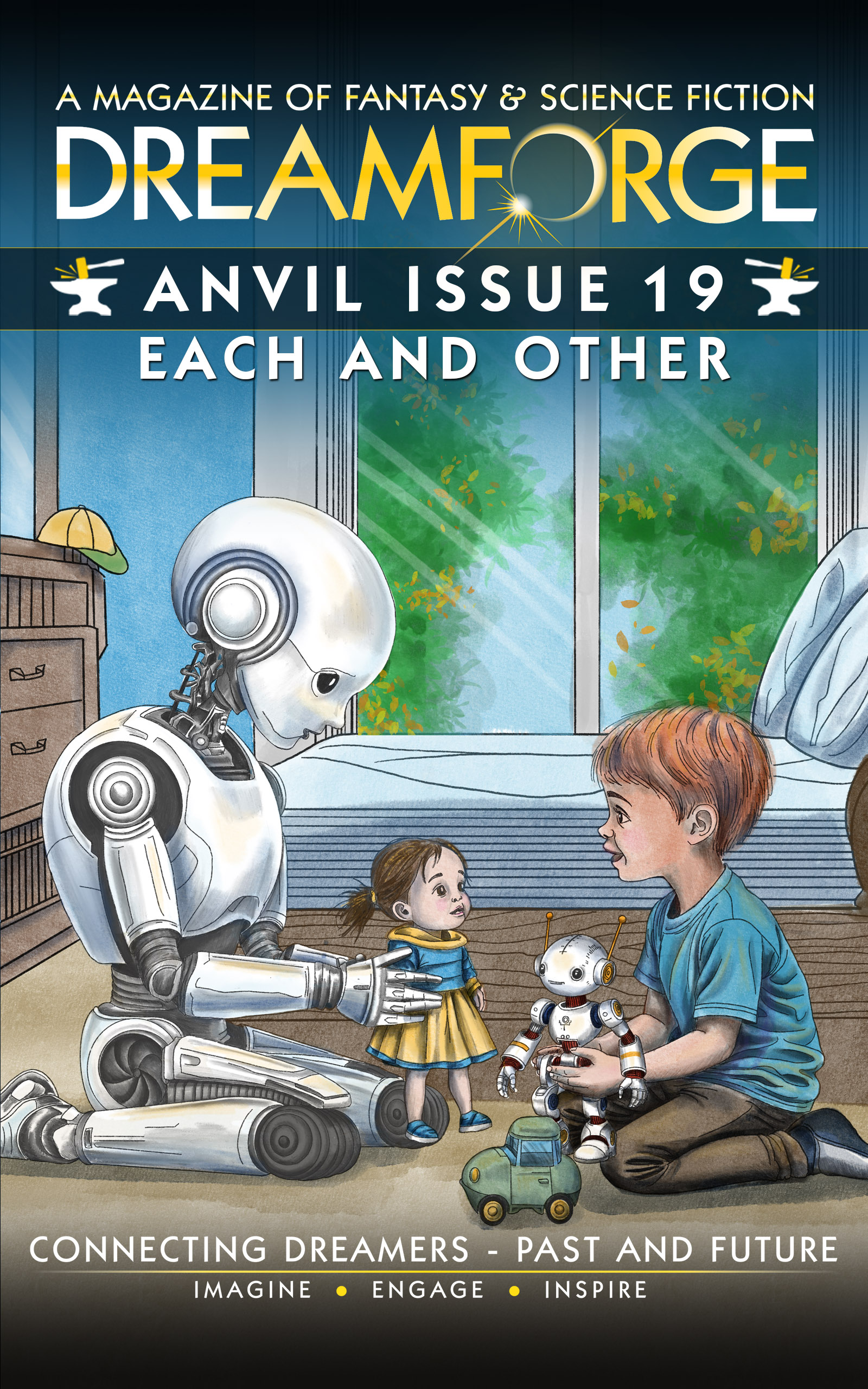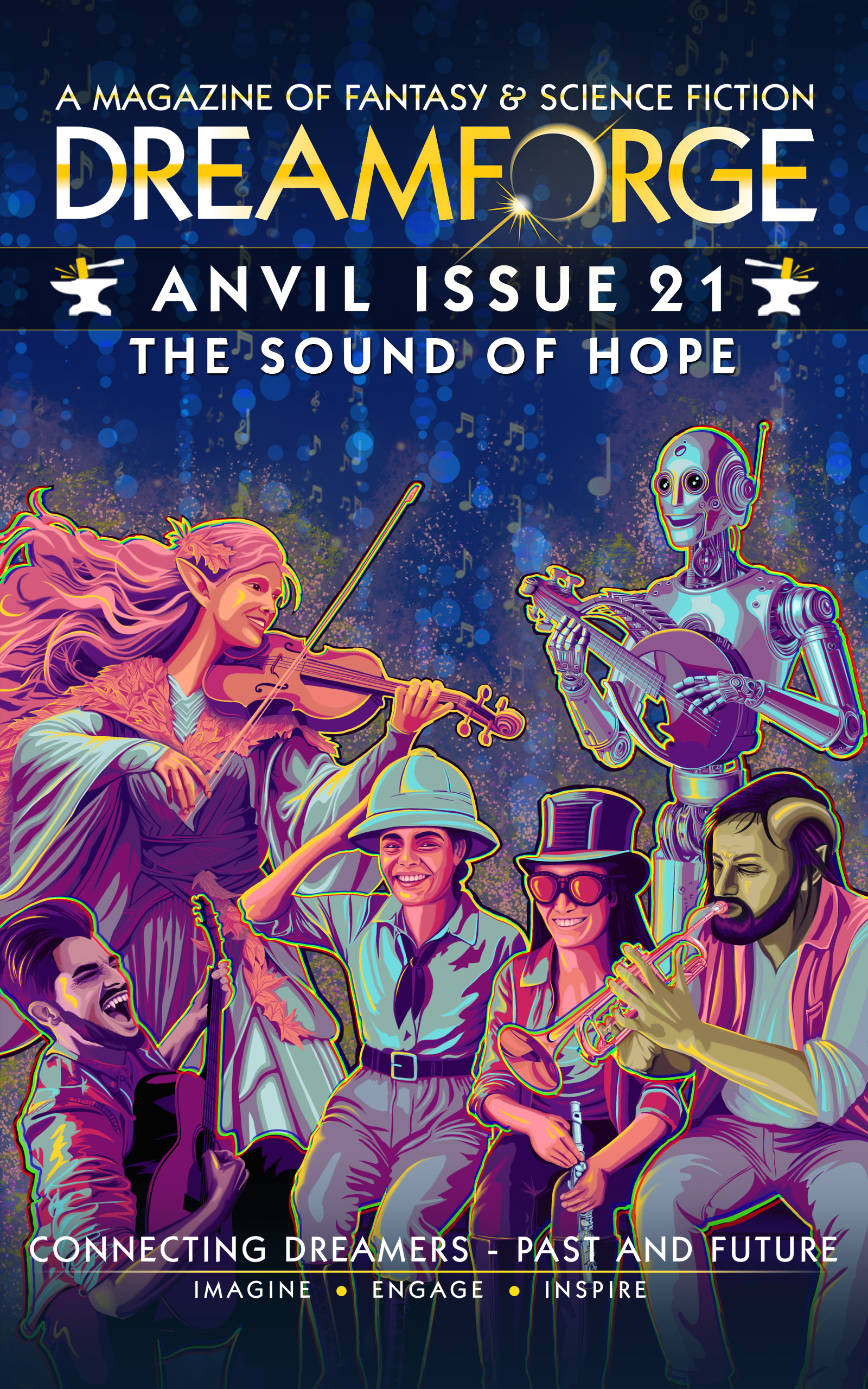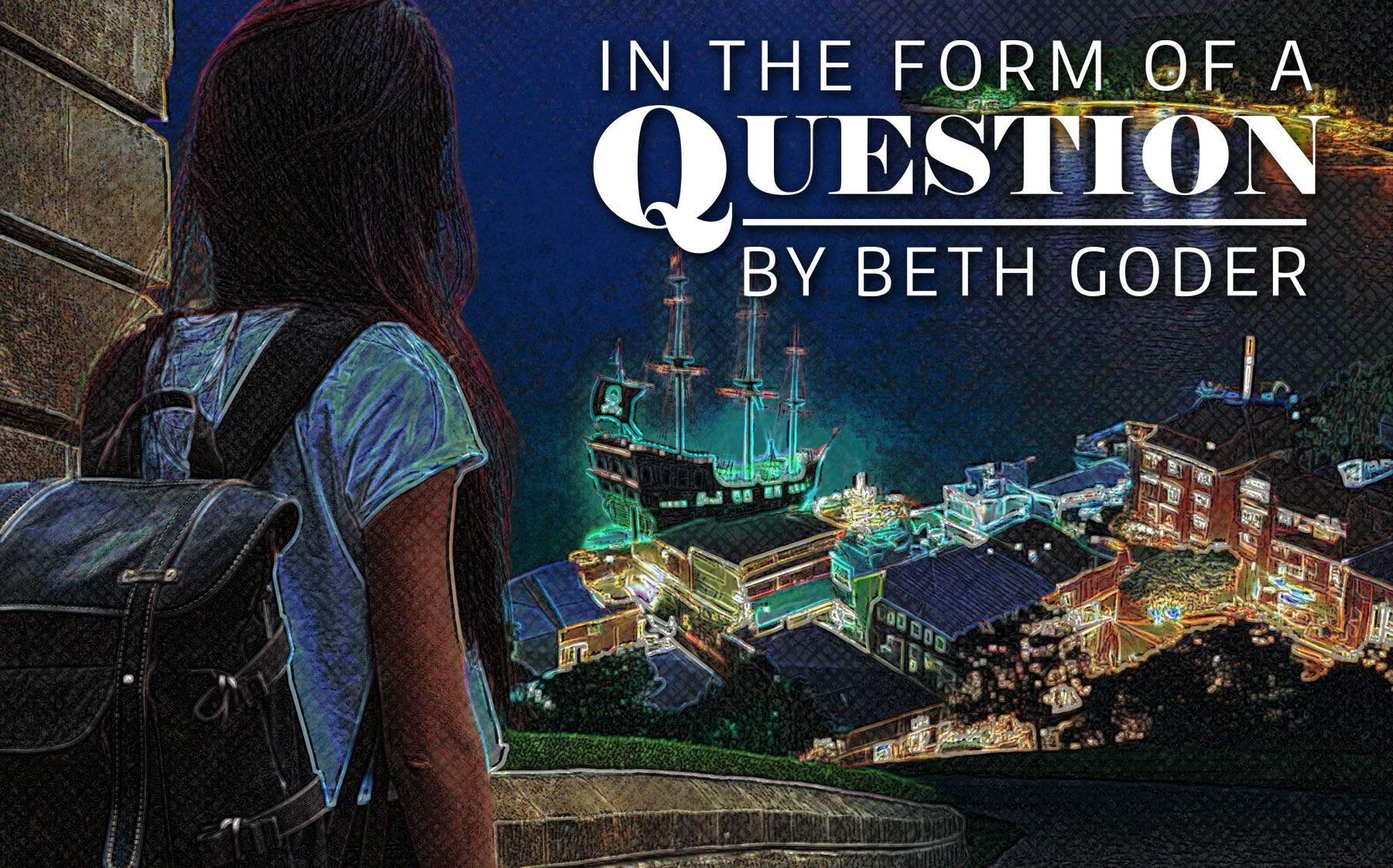
After eight hours, Cassie’s shift at Piranha Sandwiches is finally over. She shucks off her mustard-covered apron, nods to Ben at the counter, and taps the five-foot cardboard cutout of the party piranha for good luck.
As she heads for the door, a customer says, “Excuse me, can you tell me what’s in this sandwich?”
Cassie isn’t even wearing the enormous piranha hat with the teeth coming down over her forehead, but somehow, the customer can tell that she works there. Maybe it’s the mustard. Cassie has managed to get mustard on everything— her red tennis shoes, her hair, her homework for number theory (Professor Smit will not be pleased about that), her copy of the Lone Island University newspaper, right on the crossword, right on Three Down.
Cassie assures the customer that the Piranha Surprise Sandwich does not contain actual piranhas, then heads out the door.
Outside, the abandoned ghost pirate ship casts its shadow across the Lone Island University campus. The mast sticks up into the sky like a ridge of piranha teeth.
The ship has been anchored at Lone Island for centuries, and nobody knows how it got there, although there are plenty of rumors.
Piranhas jump around the base of the island. Stars gleam brightly.
Cassie heads to the pirate ship. She’s not scared, because she doesn’t believe the rumor about the ghost captain.
There are a lot of things Cassie doesn’t believe in, like free will or that people actually like eating avocados. She tells people that she doesn’t believe in God, because most of her friends are atheists, but the truth is that she thinks there’s something humming underneath the universe, some great force, and maybe that’s God. Who really knows?
Cassie feels her way against the ship’s scratchy, barnacle-covered side until she finds the secret entrance. She pulls out her flashlight, supplementing the ambient glow of the walls. The ship is known for its weird luminescence, which seems brighter tonight. Inside, the walls narrow in a comforting way.
The ship is Cassie’s favorite studying place. No one goes here, perhaps because of the creepy light and the ghost rumors and the way it sometimes feels like you are underwater, even though the ship is definitely not underwater. But it’s quiet in the way that haunted places tend to be. She has a test tomorrow in number theory, and Professor Smit doesn’t grade on a curve.
She wends her way deeper into the ship, avoiding the room with the philosopher mermaid, who always asks personal questions, like, “What are you doing with your life?” or “Don’t you regret that thing with the pumpkins?” Cassie has the uncomfortable feeling that the mermaid can read minds.
She doesn’t regret anything. Especially not the pumpkins.
Cassie reaches her favorite alcove, right next to the brackish pool that shines like oil and hides a mess of spikes. She likes it because the threat of being impaled keeps her from falling asleep. She studies for a couple hours, then gets fidgety. What’s worse, the singing of the mermaid echoes down the hall. The mermaid is probably ready with another probing question that will make Cassie reexamine her life choices, and even worse, distract her from studying.
She ventures deeper into the ship.
The walls sparkle like stars, brighter than she’s ever seen.
Maybe the brightness has something to do with the ghost captain, Cassie thinks, before she remembers that she doesn’t believe the ghost captain exists.
Cassie forges on, past the room with the three red shells, the chess board tipped on its side, and the underwater chapel, its shining walls layered with gold.
The walls glow brighter, the mermaid’s singing gets louder, and Cassie turns into a long corridor.
At the end of the corridor, she enters a room infused with light.
Inside, the ghost captain waits with arms raised like a ballet dancer. She is wrapped in seaweed bright as starlight, sparkling like a galaxy.
The captain turns. The seaweed encasing her body shivers. Seaweed made of light. Slowly, she unwraps herself, moving gracefully. The seaweed floats around her as if it’s buoyed by water, even though the ship is definitely not underwater.
Cassie has screwed up. She shouldn’t have come so far in.
Underneath the seaweed, the captain looks like Cassie, except more perfect. The captain stands straighter. Her features are more symmetrical. Her hair isn’t covered in mustard.
Is this what Cassie would look like if she actually used sunscreen? If she hadn’t taken her ninth-grade teacher’s edict that “nice girls sit up straight” as her own personal slouching challenge? It seems so unfair.
The captain smiles with Cassie’s thin lips. She wants to live again, and Cassie has given her the perfect model.
The captain points. The glittering seaweed flies toward Cassie, enveloping her. The seaweed feels like the first chill of summer, like a trickle of cold water down her back.
What did Cassie do to deserve this? She wonders if it’s some divine punishment. “Is it because I lied about the Piranha Surprise Sandwich? Because we’re supposed to say that. It’s in the employee handbook.”
The captain tilts her head.
“I have a shift tomorrow. Six hours.” Cassie raises her eyebrows, inviting the captain to think about if she really wants to take over Cassie’s life. Wouldn’t the captain rather wait for a better one?
The captain’s face crumples in concern, then straightens. For life, she is willing to bear any suffering, even a shift at the mustard-encrusted counter of an eatery which may or may not serve piranhas.
Cassie tries to bolt, thrashing her arms, but the light holds her there, like a spider caught in her own web.
The captain sails past, staring curiously at her new red tennis shoes.
Cassie feels like she should say something monumental as the undead doppelganger disappears down the corridor, but instead, she shouts, “Don’t fail my number theory exam.”
The mermaid floats in, her black hair curling into question marks. The weird thing about the mermaid is that she is clearly swimming, even though the ship is definitely not underwater. It is as if water both exists and doesn’t exist around her, like she’s an unobserved electron or something.
The mermaid sees the captain has left and gives a sad little gasp, which she quickly covers up by mussing her hair.
“What does it mean to be a person?” says the mermaid, in her typical prying fashion. The mermaid and her questions. Jeez.
Cassie’s brain feels weird, like it’s floating in a pool of light. The sensation is tingly.
It appears that being wrapped up in the seaweed of an undead ghost captain comes with some perks.
She extends the light, tentatively at first, then with conviction. She can feel the ship pulsing with life, each room lit up like a firework. She can see out across Lone Island, zoom in on Piranha Sandwiches. She can skim across the waves, farther and farther. The whole world is open, each living creature a tiny breath of light.
“Awesome,” says Cassie.
She zooms in on the captain, who is daintily making her way across the quad. The captain is doing boring stuff like looking at leaves really closely and smelling the air. Cassie catches a whiff of the hot dog stand and almost gags on the smell of mustard.
Cassie’s stomach flips over like an irate piranha, because she’s trapped in a web of light while a perfect, undead version of herself roams the campus, which is a pretty big crisis, but Cassie is also curious, because human brains are weird like that.
To test out her new powers, she zooms in on the dorm room she shares with Sadie. Cassie’s side is decorated with miniature pumpkins. They’ve populated every surface— the blue pumpkin perched on her desk, the one with the bat-shaped spots sitting on the edge of her bed, the family of pumpkins carved from red wood on her bookshelf, plus about forty more pumpkins of various sizes shoved into every possible space. She only bought the pumpkins (ten dollars a box at a garage sale) because she thought they could be her thing. It seemed like everyone at college had a thing, like Sadie, who started her own company at twelve, or Ben, who made amazing cakes, which were more like pieces of art. Wasn’t it better to be the girl with the pumpkins than the girl who laughed at her own jokes, or the girl who’d memorized Pi to the two hundredth digit (which she now realizes was not a good use of brain space, but now those digits are indelibly etched into her memory), or the girl who had no idea what she was doing with her life?
From inside the ghost ship, Cassie uses her newfound cosmic powers to watch Sadie furtively pick up the bat pumpkin and stick it in a box under her bed. Has Sadie been secretly diminishing the pumpkin herd? Is that why Cassie can’t find the pumpkin that says “Bam” in sparkling puff pink?
The mermaid clears her throat, which sounds like a rabbit hiccup, then begins to ask some questions about power and responsibility, but Cassie tunes her out. Cassie has super cool omniscient powers now, so there’s no way she’s going to waste time talking about philosophy.
She zooms in on Saturn, and checks out a few exo-planets, but that makes her nauseous, and there’s way too much dust. Deep diving in the ocean makes her feel like she’s drowning, even though she can breathe fine. She spends an hour inside a volcano before getting bored of watching the magma bubble.
She briefly considers checking in on her ex-boyfriend but decides against it because spying on people without their consent is gross, and also the mermaid is watching, and Cassie is pretty sure the mermaid can read minds.
Instead, Cassie remembers that the bus to campus went past a pineapple on the side of the road, and at the time, she was mildly curious about how it got there. Did it fall off a truck of other pineapples? Did some frat dude toss it out the window? Cassie zooms in on the street, and sure enough, the pineapple is still sitting there, looking slightly squished.
The pineapple thing seems like a good way to test out the limits of her powers. She discovers that if she crosses her eyes, she can see into the past. She scrolls backward, but time goes out of control, and she goes back too far. Now she’s at the birth of the pineapple bush, and she’s not just watching it, but experiencing the event as if she and the bush are one. Sunlight shines down on her. She drinks in water, and her roots grow into the loamy soil. A miracle of green leaves rises up. A year passes, and the first red petals of the flower shoot out like feathers. The petals harden and purple. A magnificent pineapple starts to form from coalescing leaves. The pineapple is lovingly harvested, shipped to a grocery store, and bought by an elderly couple, who forget that they’ve placed the pineapple on top of their car and not in its proper bin with the other groceries because they are having an argument about whether the adjective “circular” can apply to things that are vaguely ovaloid. The pineapple falls to the side of the road, becoming musty and squished.
Cassie’s emotions flicker from rage to despair to a kind of transcendental angst. Don’t they realize how much effort it takes to grow a pineapple? Do people have no respect for the miracle of life?
In the present time, a squirrel pokes at the pineapple on the side of the road but can’t figure out how to eat it and gives up.
Cassie disengages. She’s back in the ghost ship. In real time, about five minutes have passed. She remembers what it’s like to have arms again. Her body is not covered in a heavy shell.
Gasping, she thinks that perhaps figuring out what happened to the pineapple on the side of the road was not the best use of her epic omniscient powers.
The mermaid is shaking her head, looking disappointed.
Okay, the mermaid can definitely read minds.
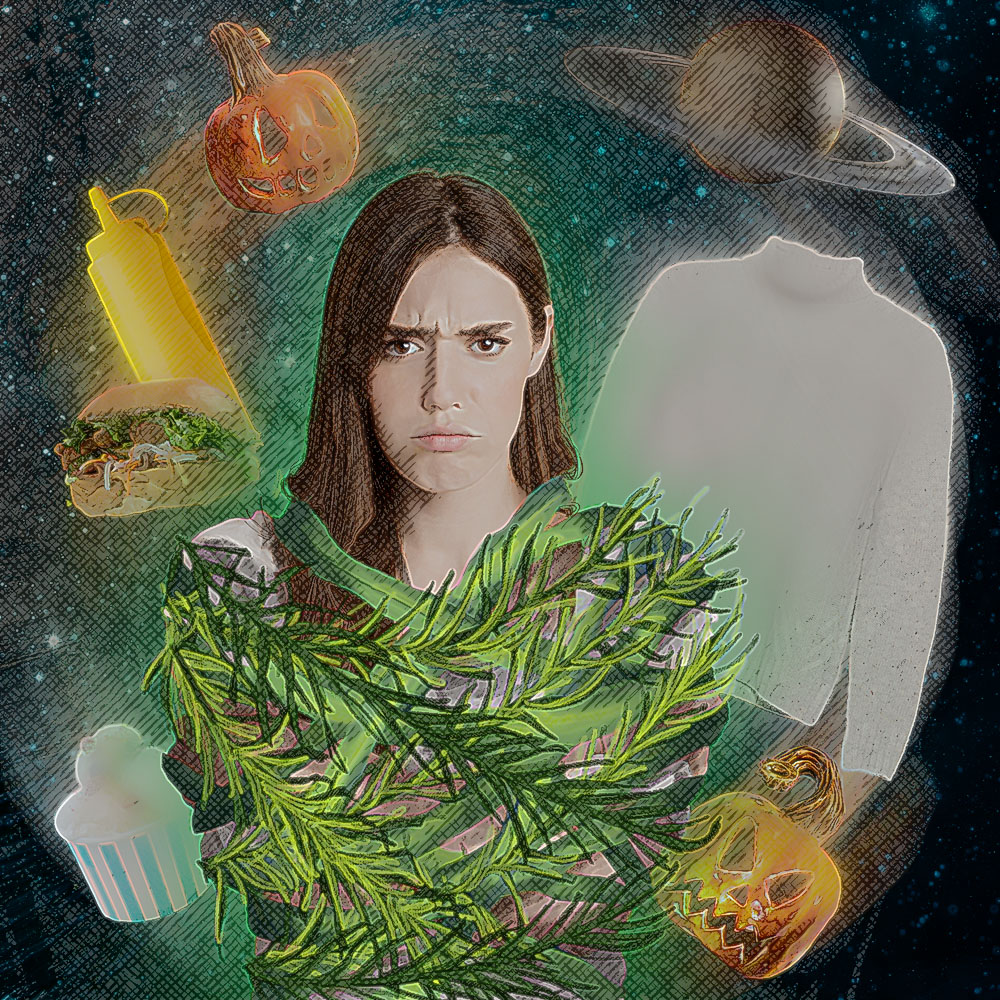
Cassie checks back in on the ghost captain, who is sitting with Sadie in their dorm room, eating ice cream. Cassie tastes vanilla on her lips, even though she’s not trying to access the captain’s senses. It’s as if a tiny part of her is wrapped up with the captain, a sliver of light so thin it’s almost transparent.
Surely, Sadie will realize that the captain is not Cassie. Great fanfare will follow. The ghost captain will be booted from the dorm room. Sadie will lead a rescue mission.
Cassie waits for Sadie to make her big move, but Sadie keeps reading her comic book. That’s okay, Cassie thinks. She’s just playing it cool.
The captain seems to be adjusting to life, since she’s no longer staring at her hands or counting every brick in the clock tower. She picks up Cassie’s favorite pumpkin, the one with the blue running through it like a river and shoves it under the bed. Cassie shouts in indignation, but the captain only smiles.
Sadie calls the captain over and points to a picture of a tree that looks like it was painted by Dali. They both laugh. The captain makes a joke about Hieronymus Bosch, which is so not cool because art jokes are Cassie and Sadie’s thing.
The worst part is, Sadie laughs like nothing is wrong, like she is not at that moment speaking to an undead interloper with amazing hair.
The captain puts on Cassie’s sweater, the one her grandmother knitted for her, and Cassie can almost feel the warmth of the wool, but she can’t quite feel it all the way. Where’s the scratchy bit at the left elbow? Where’s the cinnamon smell, faint as a whisper? The feeling of the sweater is so muted, so wrong, like the chill of a shadow when you want the sun or the taste of those store-brand imitation Cheese-Its.
With sudden force, Cassie wants her life back. Right now. Immediately. Her not-perfect, mustard-covered, way-too-many-pumpkins life. She misses her bed with the lumpy bit under her knees, and the way the leaves fall on her head when she sprints between Thaler Hall and Voorhies, and the too-sweet taste of those ice cream cups in the cafeteria. She wants to bury her head in notes for biology and complain to Ben about customers taking too many napkins and all of the normal stuff she does on Tuesdays. She wants to live the life that is hers.
She thrusts out her arms, and the seaweed made of light pulls straight-jacket tight. She kicks. She struggles. She invents new swear words. The light holds her, cool against her skin, bending but never letting go.
Cassie shouts at Sadie to denounce the imposter, but even though Cassie can zoom to Saturn, even though she can live the complete lifecycle of a pineapple, even though she can see into the minds of poets and feel the snout of a dolphin and smell the cooking pots of people who lived thousands of years ago, she can’t affect the world, only observe it.
No one can hear her, except the mermaid.
Across their tenuous connection, Cassie thumps the captain with thoughts full of violence and rage and the taste of store-brand imitation Cheese-Its. The captain juts out her elbow, knocking the purple pumpkin off the desk, where it shatters on the floor.
Sadie jumps up, asking if the captain is okay. They don’t have a broom, so Sadie goes out to look for one.
The captain picks up a shard of purple glass interlaced with gold. She gasps as she slices her finger. Cassie can feel the captain’s surprise at the pain. Real pain, not something reflected.
Exhausted from shouting, Cassie slumps against the seaweed made of light. The seaweed holds her weight, not constricting now, but gentle, as if she’s floating in a pool.
“What does the light feel like?” asks the mermaid. She says it sadly, as if hope has drained out of the world and all that’s left are ashes.
Desperately, Cassie turns to the mermaid. Maybe she has some answers. “How long does she normally go for?” Cassie can’t be the first person the ghost captain has impersonated.
Cassie waits, the light swirling around her, tense.
The mermaid raises her eyebrows. “What do you think of Kant’s categorical imperative?” The trade is clear. The mermaid won’t divulge any information about the captain until Cassie discusses boring philosophy stuff.
The categorical imperative. That’s the one about having a universal rule that could apply in all situations, like “don’t murder people” or “if your roommate is trying to study for her test it is never appropriate to play bagpipe music, not even if you really like dancing to bagpipe music.”
The mermaid nods her head, satisfied that Cassie has grasped the basics.
“Could one posit a universal rule which prohibits lying in all situations?” asks the mermaid.
This seems like a pretty basic one to Cassie. Lying should definitely be allowed. Like, if a murderer calls her up and asks, “Where you at?” Cassie is not going to tell him. Or if her grandmother knits her a sweater, isn’t Cassie morally obligated to say that the sweater is wonderful? That, actually, may be a true example of the categorical imperative. No matter who you are, if your grandmother knits you a sweater, you say you like it.
The mermaid hums cheerfully to herself, even though Cassie hasn’t spoken out loud. Is the mermaid picking this all up from her mind? Cassie thinks very loudly about boundaries and consent, and how reading minds is definitely not cool. What would Kant think?
The mermaid doesn’t care. In fact, is she whistling?
What follows is a three-hour discussion about the categorical imperative, utilitarianism, and the ethical ramifications of playing your bagpipe in the afternoon, well before the start of quiet hours, but so loud that everyone on the floor of your dorm can hear it. While making an argument for altruism, the mermaid gets so excited that she forgets to speak in a question, and hastily adds a “don’t you think?” to the end of her sentence.
At the end of the conversation, Cassie is more confused than when she started, because that is how philosophy works.
The mermaid looks like she could keep going, but Cassie is ready for some answers about stuff that will actually affect her life.
“So, when is the captain coming back?” This whole omniscient powers thing has been fun, but Cassie wants her life back now.
Through a series of questions, the mermaid conveys that the ghost captain usually gets bored of the mortal realm after about sixty years, because that’s around the time human bodies get sort of spongy.
Through a series of swear words, Cassie conveys that this is an unacceptable amount of time.
They lapse into silence. Cassie is too distraught to even go back in time and see an actual dinosaur.
The mermaid looks sad, too.
Now it’s Cassie’s turn to ask a question. “You miss her, don’t you?”
For once, the mermaid has nothing to say, but even though Cassie doesn’t have the ability to read minds, she knows the answer.
The ghost captain is slapping mustard on bread, working the assembly line with Ben at Piranha Sandwiches. It’s the lunch rush, and customers are making a line out the door. The captain flicks lettuce onto turkey. Is she smiling? Is she actually enjoying this? How is her hair not covered in mustard?
Of course, Cassie has a plan. She’s put together a reel of the best parts of having cosmic powers, kind of like a greatest hits album. She’ll use their freaky link to remind the ghost captain of what’s she’s missing.
Cassie hits the captain with the vast expanse of Saturn, the coldness of space, the majesty of the stars. And that’s just the warm-up. In quick succession, a plunge into the Great Barrier Reef, a taste of lemon meringue pie from a restaurant with three Michelin stars, a ride on the tallest roller coaster in the world, followed by a performance of a cello concerto. One epic experience after another. Somehow, the memory of being a pineapple gets in there. The captain ignores everything. She almost seems bored.
This is not what Cassie was going for. Desperately, she grabs at random images. Tea with an eighteenth-century countess, a baseball game, the feeling of a blade of grass in the sun. But everything is watered down. The tea doesn’t hold its taste. The crack of the baseball bat is muffled. Even the life pulsing in the grass is like the shadow of the thing, an outline.
It’s all lacking authenticity. How can Cassie compete with the smell of spoiling fish, the taste of mustard, the feel of Ben’s warmth as he helps the captain tie her apron strings?
The captain glides past Ben. She touches the freezer where they keep the fish. The cool sensation shoots through the link to Cassie, and it is better than all the wonders of the world.
The mermaid is watching Cassie through the locks of her question-mark hair.
“What do I need to do?” Cassie asks.
The captain, the mermaid conveys, is an entity of mystery and majesty, infinite empathy and tenderness, complete wonder and complex imaginings. The mermaid has never read her mind, but she knows these things to be true.
Cassie thinks the mermaid is in love.
The captain pulls out a sharpened pencil for the number theory exam. Professor Smit passes out the tests. By accident, Cassie dips into his mind. Professor Smit is not thinking about the test, but rather about trout fishing on the weekend, and how he will catch a bigger fish than that pretentious Professor Gum, who teaches physics and has a knack for tying flies.
Professor Smit hands out the tests. The captain is in the fourth row, where Cassie normally sits.
Time for Cassie to implement her plan.
She sends the captain the weight of her own body, the light wrapping around her. The coolness of the ghost ship. It’s the most real sensation she has access to.
The captain isn’t even paying attention. She’s on to the third exam question. The captain pauses, stumped. Despite herself, Cassie groans. Did the captain not have time to study the Euclidean Algorithm while having access to all human knowledge for centuries? Is the captain really going to fail this exam?
There’s one more thing Cassie can try. She pulls on all of her own fears and desires, her hopes for her life. She pours all of herself into one desperate plea.
The captain raises her head, listening, her face stoic, and Cassie knows it’s not enough. Cassie will be trapped forever in the ghost ship, watching the life that could have been hers.
Beside her, the mermaid sobs softly, knowing that Cassie has lost. Cassie opens her eyes, framing the coiling question-mark hair and gentle face of the mermaid in her mind. She sends the captain one last image.
The captain drops her pencil. She darts past a startled Professor Smit, out to the campus quad. She is running, stumbling on her new legs, calling out the name of the mermaid in a language so old that the phonemes slide from Cassie’s mind, disappearing into silence, until only the ache remains.
Cassie’s mind has become a conduit of frantic apologies, whispered in an unknown language, and lines of poetry and fragments of memories. Even though Cassie can’t understand the words, the message is clear— longing and loneliness. Love. And hope. That too.
It is sort of weird being the love connection between entities undead and mythic, but Cassie rolls with it.
The rooms of the ghost ship pulse with light. The captain bypasses the reading room, jumping straight down to the hidden overhang in the sail-mending room, working her way through a secret tunnel that Cassie never guessed was there. The captain arrives, breathless, in the center of the ship, where the mermaid waits.
They look deeply into each other’s eyes, clearly having a moment.
Before letting go of the starlight seaweed wraps, Cassie revisits the loamy earth of the pineapple bush for one more shining instant. Then, she unfolds her body.
The light flows around the captain and the mermaid, cocooning them together.
Back in her dorm room, Cassie gathers up the sweater from her grandmother. She hugs it to her chest, feeling the scratchy patch at the elbow, smelling that cinnamon smell, faint as a whisper.
In the morning, she will tell Professor Smit she was ill during the exam (not entirely a lie) and beg for a retake. She will find the pineapple by the side of the road and shepherd it to the compost heap, first checking to see if it contains fertile seeds. When she next goes to the ghost ship, she will bring a philosophical treatise for the mermaid, full of contradictions. For the captain, she will bring a cooler filled with piranhas on ice, so the captain can plunge her light-infused hands into coolness once again, and also because the captain kind of deserves a container of rotting fish for taking over Cassie’s life.
Cassie takes the box out from under Sadie’s bed, intending to free her pumpkins, but instead of taking pumpkins out, she puts more pumpkins in. She’s seen so much in the past few days. She’s traveled to Saturn. She was an actual pineapple. Does she really need all of these pumpkins to be a worthwhile and interesting human being?
Cassie groans, because that seems like a question the mermaid would ask, annoying and penetrating and undeniably true. But she doesn’t regret the thing with the pumpkins. She doesn’t regret any of it.
Cassie still has mustard in her hair, but for once, she doesn’t mind.


